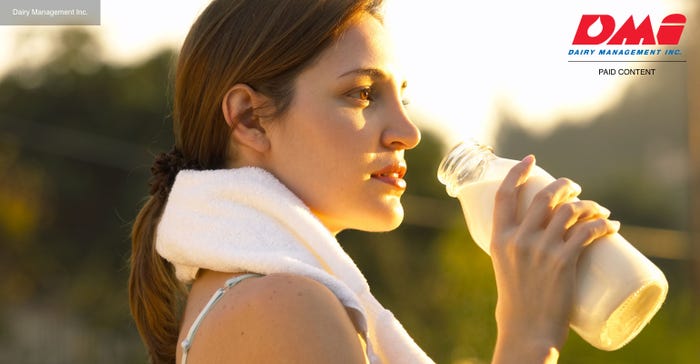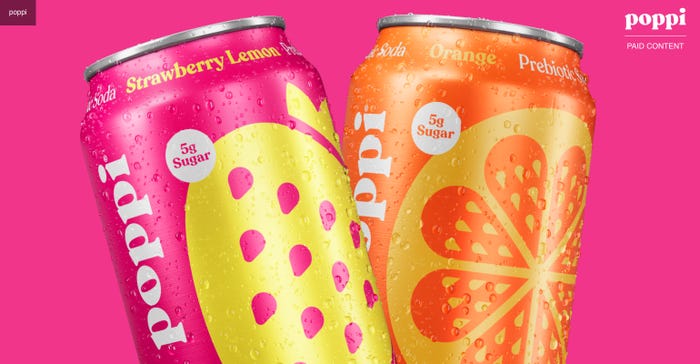.png?width=700&auto=webp&quality=80&disable=upscale)
Checkout: Sunrise Health Foods brightens Chicago’s South Side with organic foodsCheckout: Sunrise Health Foods brightens Chicago’s South Side with organic foods
With a passion for organic foods, the Chapman family founded a small health foods store on Chicago’s South Side more than 60 years ago. Find out how the second generation built it into a Midwestern chain.
December 3, 2024

At a Glance
- Sunrise Health Foods offers USDA Organic fresh produce, smoothies and juice bars to neightborhood shoppers.
- Dan Chapman, the current owner, has created a chain of stores while he founded an herbal supplement brand, Redd Remedies.
- Offering organic produce in the Midwest differentiates Sunrise Health Foods stores from conventional competitors.
When Lill and Herman Chapman opened their little health food store on the far south side of Chicago in 1961, the young couple figured they’d give it a year. If business took off in that time, great, they reasoned. If not, they wouldn’t sweat it. Real estate developer Herman would just find a new tenant for the 900-square-foot space in the building they owned, and Lill would go back to teaching biology.
Well, more than 60 years later, Sunrise Health Foods is still rocking, with three locations in the southern suburbs of Chicago, plus one in Valparaiso, Indiana, and another in Peoria, Illinois.
Credit the couple’s son, Dan Chapman, for carrying on Lill’s enthusiasm for organic whole foods and nutrition education while nurturing and expanding the business. Dan is also passionate about the power of herbal formulas, leading him to launch Redd Remedies in 2005. This put him in the unusual position of owning both a handful of independent natural products stores and a national supplement brand.
Here, Dan shares more of his and his family’s remarkable story.
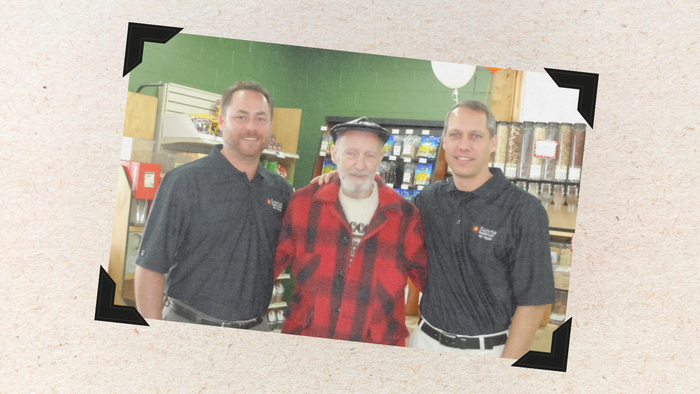
From left, Ken El-Talabani, chief operating officer at Sunrise Health Foods; Herman Chapman, co-founder; and Dan Chapman, owner
What compelled your folks to start a health food store way back in 1961?
Dan Chapman: If you started a health food store in the 1960s, it was for one of two reasons: You were a hippie or you were sick. My mom was sick. In the 1950s, she was in her young 20s, and her body was struggling. It was hard for her to understand or explain, but certain foods gave her anxiety, like showstopping anxiousness, rapid heart rate, depression and fatigue.
Now, anxiety was not well understood back then or something you really talked about. She went to a lot of doctors, and they didn’t know what to do for her. Oftentimes, they’d suggest she was just stressed and needed to slow down. My mom was convinced there had to be another cause—and there had to be a way to feel better.
One day a dentist, of all people, suggested she change her diet. In the 1950s, that was not common sense, so my mom thought no way would that do anything. But this guy was really convinced it would help, and he was the first person to give her some hope, so she did it. It was a basic elimination diet to figure out if foods were impacting her and which ones.
And that made a difference?
DC: Within the first week, she started to feel very different. That’s when the lightbulb went on, like, “Oh my goodness, food makes an immediate impact on how I feel.” Processed foods with pesticides and herbicides were the first things they isolated as making an impact on her health—it was chemicals for sure. Little by little, my mom was getting better. That was just the start.
That must’ve been so invigorating after a long, frustrating journey!
DC: Yes. The mom I described that was anxious and fatigued was not the mom I knew. I knew a mom who was healthy, vibrant and passionate about food and nutrition. My mom was a schoolteacher and very inquisitive, so she dove in and learned everything she could about food, nutrition, farming, food processing and what are these pesticides and herbicides being put on these foods? Then she started helping other people. On a prayer, they opened the health food store next to my dad’s real estate office in Roseland, which is on the south side of Chicago.
Natural and organic foods were scarce in 1961! How did they find inventory?
DC: That’s part of the reason opening a store made sense to them. You couldn’t buy organic food back then, so my mom was sourcing chemical-free whole foods from all over. She’d find an apple orchard over here that didn’t spray, then she’d order a case of papayas from California. My parents thought, “It’s hard for us to eat a case of papayas before they rot, but if we have a store …”
There were enough other people interested in this food to make the business work?
DC: Yeah, but I don’t think my parents had high expectations for income. Fortunately, my dad made a living in real estate. The health food store was more of a family hobby. I mean, they were certainly making some money, but I don’t know if they were making a living.
What was it like having such health-conscious parents?
DC: I enjoyed it! I must’ve been that weird kid. At school, my lunches were definitely different—there was no trading with the other kids! My bread was dark and crumbly while everybody else had white bread. In our kitchen, we had seaweed—dulse, specifically—in our cookie jar, and I’d just grab a hunk and eat it. My mom made her own “milk” for buckwheat pancakes by putting zucchini and water in a blender. Everything was from scratch.
I wouldn’t trade that for anything in the world. I learned to love and appreciate food for all of its different flavors. And I knew some things didn’t taste incredible but were good for you.
Did you spend much time in the store as a kid?
DC: I went there with my mom a lot. At 8 and 9 years old, I was helping customers find what they needed and checking them out at the register. I loved it. They had moved the store from Roseland to Lansing in 1967. Dad built that store, which was originally called Sunrise Farm Health Foods, and made it look like a barn in the front. That’s the store I knew.
I worked there consistently in high school, and when I was a junior, I told my mom and dad that this was what I wanted to do for a living. After college, I made this my career.
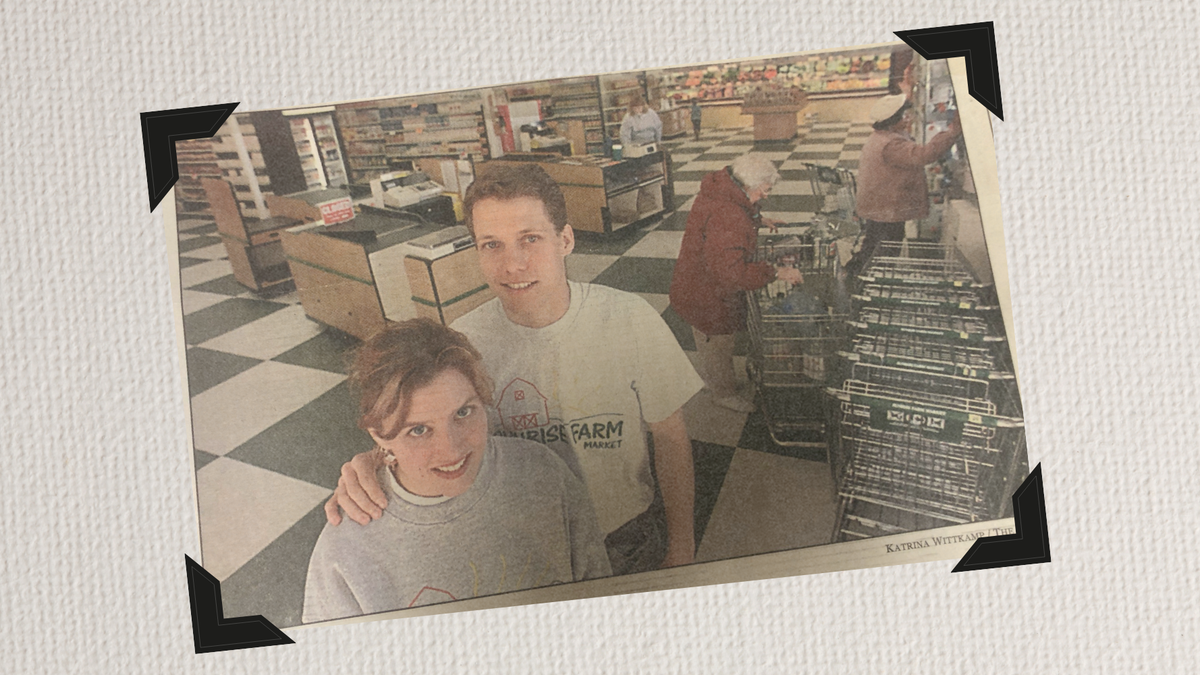
Dan Chapman and his wife, Valerie Chapman, stand in the newly remodeled Lansing location in 1995. The now-closed Lansing Times newspaper featured the store on Dec. 1, 1995.
What was your path to ownership?
DC: The transition happened relatively early on, in my late 20s. My mom worked at the store her whole life but never cared about the business side. She was a certified clinical nutritionist and just wanted to help customers. I was running the business, so I bought it in the late 1990s.
When did you expand?
DC: I opened our second store, in Flossmoor, in October 2002. The next three stores I purchased: Valparaiso in 2013, Country Club Hills in 2017, Peoria in October 2019. They all had been health food stores, and I rebranded them as Sunrise Health Foods.
How would you describe Sunrise today?
DC: We’re a neighborhood healthy grocery, which means we’re a small footprint, the customers know us and we know them. It’s a place of connection, a place you can ask questions and trust the answers.
What are your standout departments?
DC: Our produce sections are 100% certified organic. That’s challenging in the Midwest, but it sets us apart. Our philosophy is if a produce item isn’t available, then you need to learn to use an alternative. Organic food was my mom’s start for the store, so we’ve had strict standards all along. We also have organic juice and smoothie bars in-store that do incredibly well for us, and we’re strong in supplements. We do not have full kitchens, but we make things like salads and sandwiches. Our frozen meat is all locally sourced and really good quality.
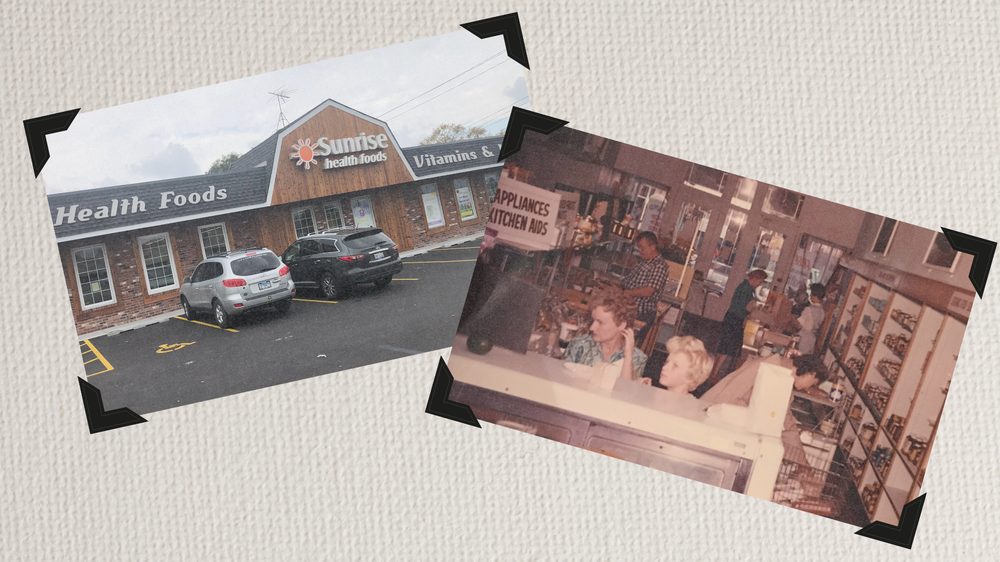
Left, Herman Chapman, who worked in real estate, built the Lansing, Illinois, location of Sunrise Health Foods in 1967. The photo on the right shows the interior of the very first store—known as Sunrise Farms Health Foods, which opened in 1961—next to Chapman’s real estate office in Roseland.
Do you carry local produce too?
DC: In the Midwest, it is minimally local, and that’s just the reality for us. We work with some local farmers directly, just not as many as we would aspire to.
Please tell me about your staff.
DC: I am so fortunate to have a great team with remarkable longevity. I haven’t worked in my stores for about 12 years, which is the only way I could start a supplement company. Ken El-Talabani runs Sunrise today. He has worked with me for 26 years. The number of people who’ve been with me for 10-plus years is shocking, even at the stores that we purchased. We’ve done a really good job of caring for people, lifting them up and helping them feel good about their work.
What prompted you to launch Redd Remedies?
DC: There are a handful of reasons. One was just practical. At that time, there were very few herbal formulas available [to address specific health issues]. The other reason was the changes happening within the industry. We were growing as an industry, but as the brands I loved were being sold off, the culture of the companies changed. The industry became marketing driven, and I don’t want marketing to drive the supplements I take. I want results to drive them. I want products put together according to research. I am very careful not to speak against our industry, but honestly, I was mad.
So, with Redd Remedies, we craft formulas to help people feel better. A master herbalist has worked with me since the beginning. We’re a national brand sold in health food stores across the U.S.
What is it like operating both a retail business and a supplement brand?
DC: It’s busy! But I am so grateful. I still believe in the power of a local health food store to make an impact in the community. I get to participate in that through my own stores, but I also get to have that experience in someone else’s health food store, by creating products that are changing people’s lives for the positive.
When you look back over your career, what makes you proudest?
DC: One of my proudest achievements is my team. I could not do what I do today without the team that has come alongside me for so many years, both at Sunrise and Redd Remedies. I love to talk with customers about their health issues, and I get to spend most of my time giving trainings and seminars on health.
I am also proud that Redd Remedies will be 20 years old next year. Sometimes I can’t believe I was able to start this company while at the same time growing the health food stores. Yet here we are.
What do you enjoy outside of work?
DC: I love being outside, hiking, motorcycles and dirt bikes. And I love being with my family—my wife, Val, and our kids. Our oldest is 23 and youngest is 15. Our 21-year-old is a senior in college studying marketing and business, and he has expressed interest in working at Sunrise once he graduates, so I am very excited about that.
Read more about:
OrganicAbout the Author
You May Also Like

